External links
| Novels |
|
|---|---|
| Short stories |
|
| Nonfiction |
|
| Other |
|
| Related | |
| | This article about a short story (or stories) published in the 1920s is a stub. You can help Wikipedia by expanding it. |
"The Life to Come" is a short story by English writer E. M. Forster, written in 1922 and published posthumously in The Life to Come (and Other Stories) in 1972.
It was written into four chapters: Night, Evening, Day and Morning.
In 2017, Surrey Opera gave the world premiere of The Life to Come, an opera in two acts by British composer Louis Mander, with libretto by Stephen Fry.

A ballad is a form of verse, often a narrative set to music. Ballads derive from the medieval French chanson balladée or ballade, which were originally "dance songs". Ballads were particularly characteristic of the popular poetry and song of Great Britain and Ireland from the Late Middle Ages until the 19th century. They were widely used across Europe, and later in Australia, North Africa, North America and South America.

Madama Butterfly is an opera in three acts by Giacomo Puccini, with an Italian libretto by Luigi Illica and Giuseppe Giacosa.

A libretto is the text used in, or intended for, an extended musical work such as an opera, operetta, masque, oratorio, cantata or musical. The term libretto is also sometimes used to refer to the text of major liturgical works, such as the Mass, requiem and sacred cantata, or the story line of a ballet.

Rigoletto is an opera in three acts by Giuseppe Verdi. The Italian libretto was written by Francesco Maria Piave based on the 1832 play Le roi s'amuse by Victor Hugo. Despite serious initial problems with the Austrian censors who had control over northern Italian theatres at the time, the opera had a triumphant premiere at La Fenice in Venice on 11 March 1851.

A rock opera is a collection of rock music songs with lyrics that relate to a common story. Rock operas are typically released as concept albums and are not scripted for acting, which distinguishes them from operas, although several have been adapted as rock musicals. The use of various character roles within the song lyrics is a common storytelling device. The success of the rock opera genre has inspired similar works in other musical styles, such as rap opera.
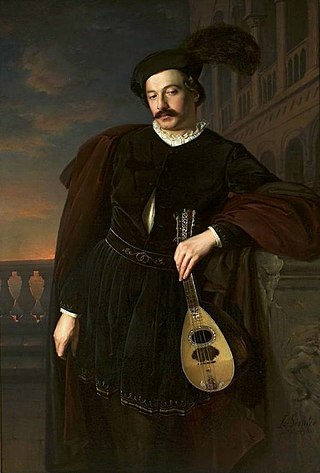
Don Juan, also known as Don Giovanni (Italian), is a legendary, fictional Spanish libertine who devotes his life to seducing women.

La sonnambula is an opera semiseria in two acts, with music in the bel canto tradition by Vincenzo Bellini set to an Italian libretto by Felice Romani, based on a scenario for a ballet-pantomime written by Eugène Scribe and choreographed by Jean-Pierre Aumer called La somnambule, ou L'arrivée d'un nouveau seigneur. The ballet had premiered in Paris in September 1827 at the height of a fashion for stage works incorporating somnambulism.
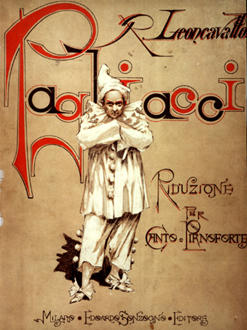
Pagliacci is an Italian opera in a prologue and two acts, with music and libretto by Ruggero Leoncavallo. The opera tells the tale of Canio, actor and leader of a commedia dell'arte theatrical company, who murders his wife Nedda and her lover Silvio on stage during a performance. Pagliacci premiered at the Teatro Dal Verme in Milan on 21 May 1892, conducted by Arturo Toscanini, with Adelina Stehle as Nedda, Fiorello Giraud as Canio, Victor Maurel as Tonio, and Mario Ancona as Silvio. Soon after its Italian premiere, the opera played in London and in New York. Pagliacci is the best-known of Leoncavallo's ten operas and remains a staple of the repertoire.
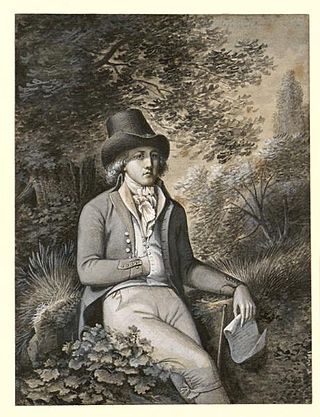
Andrea Chénier is a verismo opera in four acts by Umberto Giordano, set to an Italian libretto by Luigi Illica, and first performed on 28 March 1896 at La Scala, Milan. The story is based loosely on the life of the French poet André Chénier (1762–1794), who was executed during the French Revolution. The character Carlo Gérard is partly based on Jean-Lambert Tallien, a leading figure in the Revolution. It remains popular with audiences, though less frequently performed than in the first half of the 20th century. One reason for its survival in the repertoire is the lyrical-dramatic music provided by Giordano for the tenor lead, which gives a talented singer opportunities to demonstrate his skills and flaunt his voice. Giuseppe Borgatti's triumph in the title role at the first performance immediately propelled him to the front rank of Italian opera singers. He went on to become Italy's greatest Wagnerian tenor, rather than a verismo-opera specialist.

Agnes Nixon was an American television writer and producer, and the creator of the ABC soap operas One Life to Live, All My Children, as well as Loving and its spin-off The City.

A Life for the Tsar is a "patriotic-heroic tragic opera" in four acts with an epilogue by Mikhail Glinka. During the Soviet era the opera was known under the name Ivan Susanin.

Luisa Miller is an opera in three acts by Giuseppe Verdi to an Italian libretto by Salvadore Cammarano, based on the play Kabale und Liebe by the German dramatist Friedrich von Schiller.
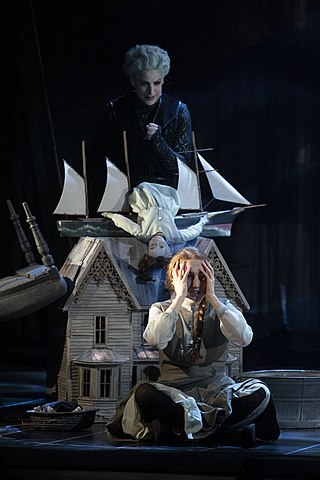
The Turn of the Screw is a 20th-century English chamber opera composed by Benjamin Britten, with a libretto by Myfanwy Piper, based on the 1898 novella The Turn of the Screw by Henry James.

I Capuleti e i Montecchi is an Italian opera in two acts by Vincenzo Bellini. The libretto by Felice Romani was a reworking of the story of Romeo and Juliet for an opera by Nicola Vaccai called Giulietta e Romeo and based on the play of the same name by Luigi Scevola written in 1818, thus an Italian source rather than taken directly from William Shakespeare.

Shining Brow is an English language opera by the American composer Daron Hagen, first performed by the Madison Opera in Madison, Wisconsin, April 21, 1993. The libretto is by Paul Muldoon, and is based on a treatment co-written with the composer. The story concerns events in the life of architect Frank Lloyd Wright. Hagen invited Muldoon to write the libretto while the two were both in residency at the MacDowell Colony, in Peterborough, New Hampshire during the summer of 1989.
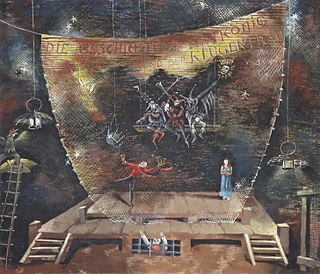
Die Kluge. Die Geschichte von dem König und der klugen Frau is an opera in 12 scenes written by Carl Orff. It premiered at the Frankfurt Opera, Germany, on 20 February 1943. Orff referred to this opera as a Märchenoper. The composer also wrote the libretto, based on "Die Kluge Bauerntochter" from Grimms' Fairy Tales. A performance lasts for about 90 minutes and is often paired with Orff's Der Mond.
Helen Retires is the second opera by George Antheil. The libretto was written by John Erskine based on his novel The Private Life of Helen of Troy (1925). It was written in 1931 but not performed until 1934 when it was produced by the Juilliard School.
Robin Hood is a comic opera by Reginald De Koven (music), Harry B. Smith (lyrics) and Clement Scott. The story is based on the Robin Hood legend, during the reign of King Richard I. The opera was composed in Chicago, Illinois during the winter of 1888-1889.
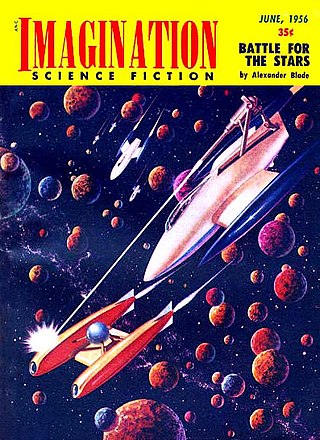
Space opera is a subgenre of science fiction that emphasizes space warfare, with use of melodramatic, risk-taking space adventures, relationships, and chivalric romance. Set mainly or entirely in outer space, it features technological and social advancements in faster-than-light travel, futuristic weapons, and sophisticated technology, on a backdrop of galactic empires and interstellar wars with fictional aliens, often in fictional galaxies. The term does not refer to opera music, but instead originally referred to the melodrama, scope, and formulaic stories of operas, much as used in "horse opera", a 1930s phrase for a clichéd and formulaic Western film, and "soap opera", a melodramatic domestic drama. Space operas emerged in the 1930s and continue to be produced in literature, film, comics, television, video games and board games.